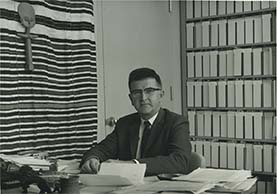Mahlon Brewster Smith ’39
Mahlon Brewster Smith ’39, August 4, 2012, in Santa Cruz, California. Prominent social scientist Brewster Smith reported that he arrived at Reed “an all too proper kid from Corvallis” and two years too young for his class. He was the only child of an English professor from Syracuse, New York, who had been appointed dean at Oregon State. Brewster joined the Young Communist League at Reed, using the pseudonym Stephen Daedalus on his membership card. Poor class attendance in his junior year led to his leaving Reed. “I was well launched in psychology by Monte Griffith [1926–54], but I was otherwise an academic basket case, having also majored in adolescent identity turmoil, radical politics, and the lure of the Skidmore Fountain.” He found the study of psychology to be beneficial in his search for self-knowledge. He transferred to Stanford, where he earned both undergraduate and master’s degrees. “Though I didn’t graduate from Reed, I’ve always been grateful to Reed as the place that let me become who I am.” He and roommate Pete Stratton ’38 reminisced often about Reed, providing fodder for a friend’s limerick:
Two students, their minds not too stable,
Have a fondness for myth and for fable.
They go on without heed
Babbling fondly of Reed
While their friends go to sleep at the table.
Shortly after he began his doctoral studies at Harvard, Brewster was drafted into the army. During World War II, he developed tests to classify prospective aircrew members and later did psychological research in the U.S. and overseas, contributing his findings to The American Soldier: Combat and Its Aftermath (1949). Back at Harvard, he completed a thesis in social psychology and later published Opinions and Personality based on his project. In 1947, Brewster and Deborah Anderson were married. They raised a daughter and three sons, including Torquil Smith ’78. Brewster taught at Harvard, Vassar, New York University, UC Berkeley, the University of Chicago, and UC Santa Cruz, where he was vice chancellor for social sciences. He also worked at the Social Science Research Council in New York City for several years. During his career, he served as editor of the Journal of Social Issues and the Journal of Abnormal and Social Psychology. He was a member of the American Psychological Association (APA), fellow of the Center for Advanced Study in the Behavioral Sciences, and chair of advisory committees for the National Science Foundation and the National Institute of Mental Health. Brewster thought of himself as a generalist, based in social and personality psychology, and he played an active role in the humanistic division of the APA. He wrote more than 300 publications, including his collected writings, For a Significant Social Psychology. Among his many honors, he received the Kurt Lewin Memorial Award, the most prestigious honor in social psychology; the Harold Lasswell Award for scholarly contributions to political psychology; the APA award for Distinguished Contributions to Psychology in the Public Interest; and the Western Psychological Association’s Lifetime Service Award. He was exceptionally proud of the testimony he gave in a case before a federal appeals court in Richmond, Virginia—a case that led to the Supreme Court’s decision to ban school desegregation in Brown vs. Board of Education. “My politics as a Reed student got me hauled up before the Jenner Committee during the episode of McCarthyism, and kept me blacklisted for a decade at NIMH, but I have continued my Reed commitments to active concern with social problems, including race and student protest in the ’60s, and war and peace.” Survivors include Brewster’s wife, children, and five grandchildren.
Appeared in Reed magazine: December 2012
comments powered by Disqus



![Photo of Prof. Marvin Levich [philosophy 1953–94]](https://www.reed.edu/reed-magazine/in-memoriam/assets/images/2022/LTL-levich1.jpg)
![Photo of President Paul E. Bragdon [1971–88]](https://www.reed.edu/reed-magazine/in-memoriam/assets/images/2020/Bragdon.jpg)
![Photo of Prof. Edward Barton Segel [history 1973–2011]](https://www.reed.edu/reed-magazine/in-memoriam/assets/images/2020/Segel.jpg)








































































